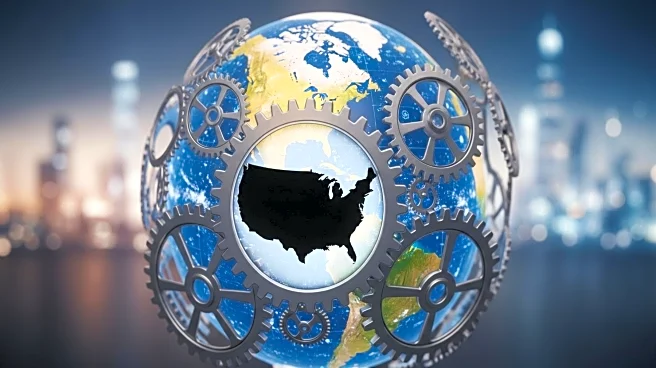What is the story about?
What's Happening?
The World Trade Organization (WTO) has released a report indicating that the full impact of tariffs imposed by US President Trump will significantly affect global trade growth in 2026. Despite a resilient first half of 2025, merchandise trade volumes are expected to rise by 2.4% this year, a notable increase from the 0.9% growth predicted earlier. However, the forecast for 2026 has been downgraded to a 0.5% rise, down from the previous estimate of 1.8%. The WTO attributes this shift to the delayed effects of tariffs on US imports, which are expected to fully manifest next year. The report highlights signs of weakness in trade and manufacturing output in developed economies, including reduced business and consumer confidence and slower growth in employment and incomes.
Why It's Important?
The anticipated slowdown in trade growth due to US tariffs has significant implications for global commerce and economic stability. The tariffs, which have been a point of contention in international trade relations, could lead to decreased business confidence and hinder economic growth in developed countries. The WTO's report underscores the importance of stable trade policies and the potential risks associated with unilateral measures. The resilience observed in the first half of 2025, driven by AI-related goods, suggests that technological advancements may play a crucial role in mitigating some negative impacts. However, the broader economic consequences of tariffs could affect employment, income growth, and consumer confidence, posing challenges for policymakers and businesses worldwide.
What's Next?
As the full impact of US tariffs is expected to be felt in 2026, stakeholders in global trade may need to prepare for potential disruptions. Businesses might consider adjusting their strategies to account for slower trade growth and increased uncertainty in trade policies. Policymakers could face pressure to negotiate trade agreements that mitigate the adverse effects of tariffs and promote economic stability. The role of AI-related goods in driving trade growth may continue to be a focus, with potential investments in technology sectors to sustain economic resilience. Monitoring developments in trade policies and economic indicators will be crucial for anticipating future trends and challenges.
Beyond the Headlines
The WTO's report highlights the complex interplay between trade policies and global economic dynamics. The delayed impact of tariffs underscores the importance of considering long-term consequences in trade negotiations. The resilience of AI-related goods in driving trade growth suggests a shift towards technology-driven commerce, which could redefine global trade patterns. Ethical considerations regarding the use of tariffs as a political tool may arise, prompting discussions on fair trade practices and international cooperation. The evolving landscape of global trade may require adaptive strategies from businesses and governments to navigate uncertainties and leverage opportunities in emerging sectors.















